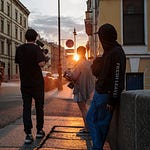Photo by the author
Yesterday, one of my clients asked if we could spend our time together talking about prayer. He wondered what kinds of practices might be grouped under its meaning. We walked through our understandings of what prayer might look like in a religious, a spiritual, and a secular context.
He told me he doesn’t want to loose his awareness of the preciousness of life. He works in an industry where topics like the fleeting nature of existence, and the necessity of treasuring the embodied present, are never discussed. His company works to evoke a deep sense of lack in its customers, in order to keep selling its products.
The ubiquitous, mundane conversations of his co-workers (or their unwillingness to bring these issues up in a corporate context) sadden him, and make him feel alienated. But he has a dogged nature, despite his wistfulness, and so we found a way for him to pray anywhere, even in contexts designed to blot it out.
My client is a person with an abiding interest in the magnificence of life. He was not prompted to bring up prayer because of the shooting at Club Q. Nor was he inspired because this is Thanksgiving week in the United States. Our discussion was instead a continuation of our longstanding conversations about meaning and purpose, embodiment and contemplation.
There is something about the insistence that one express gratitude on a particular day that rubs me the wrong way. Though I appreciate the idea of gathering and expressing reverence for all that one has, I think that forcing a person to express gratitude when he feels otherwise can engender in him the belief that everyone else has so much to be thankful for, and he must muzzle himself or risk exclusion from his community.
The person who believes he’s been robbed of the gifts he thinks are the patriarchal right of men; the person who is forced to say he is thankful for his riches when instead he feels inhuman and reviled, or who believes he cannot measure up to the strict definitions of white patriarchal masculinity; this is a person who may fantasize he can force others to feel as he does, drag them into his misery and loneliness. These are the psychological characteristics of men who engage in mass shooting events.
Last night I watched an interview with Richard Fierro who, along with a person only identified as a “drag queen in heels,” tackled and subdued the shooter at Club Q. Fierro is a veteran who served in the Army for 15 years, completing tours in Afghanistan and Iraq. He wept as he spoke about the people he has buried in combat, in country.
Tipping his head back in grief and exasperation about the events at the club, he asked the people watching him on television to express as much love as they could to the people around them. I could see on his face the look soldiers get when they talk about civilians—so much innocence, so much stupidity, so much waste—why would you kill people in a club on a regular evening, in a space that has provided love and community and care for the last twenty years, when there are so many brutal killings happening in places you’ll never see, for complex geopolitical reasons, for terrifying and grotesque reasons, for reasons that cannot be said aloud, even by the people who were there?
Richard Fierro is not a person who needs to be reminded of the preciousness of life, or to be told he should be grateful for what he has. He willingly threw himself into the face of death, again, and survived. Watching him, knowing veterans like him, I know he would do it again tomorrow.
Here are three men—my client, the shooter, and Richard Fierro—each of whom is expressing a different form of masculinity, of power, of identity and meaning, all in negotiation with the dominant culture’s ideal of what white patriarchal masculinity means, what it looks like, and what its power confers.
I do not know the motivation of the Club Q shooter. I have written elsewhere about why certain men find themselves wanting, or immoral, or vile, and compensate for their internal sense of feminine weakness by engaging in public, phallic violence. I’ve also asked why current analyses of mass shooting events generally avoid examining the role of patriarchal masculinity in men’s impetus to commit mass shootings, and what might happen if patriarchy was actively contested as a source of mass violence.
What I find hopeful in this moment is that so many men are in negotiation with the limitations of a singular ideal of masculinity. So many men are taking the risk of talking about the ways they have been barred from their full range of feeling, and from expressing vulnerability and intimacy. Even in their loneliness and fear that they are unique, or odd, or misfits, for wanting to be able to express themselves, they are speaking up. Even in the face of a uniform, white patriarchal ideal of masculinity, men from different identities, ethnicities, and subcultures, are describing and valuing different ways of being men.
One of the gifts of queer culture is that it has an entire vocabulary, a storied history, a theoretical apparatus, and practices of celebration, all of which are designed to help people grapple with the violence of patriarchy and the limitations of binary conceptualizations of gender. This is in part why queer culture, and queer people, are so often attacked and destroyed.
There is a fracturing of masculinity occurring now that is a source of hope for some, and of panic and devastation for others. This is work that men are doing, and must do, for themselves. But if I may offer up my own kind of prayer in this moment of gratitude and longing and rebellion and violence, it is that if I can be of any help in this work, that you will tell me, and I will join in.
Rebecca
A quick housekeeping note:
We are moving into the holiday season, and I am going to downshift to an every-other-week schedule in December and early January, in anticipation of everyone’s busy schedules.













Share this post